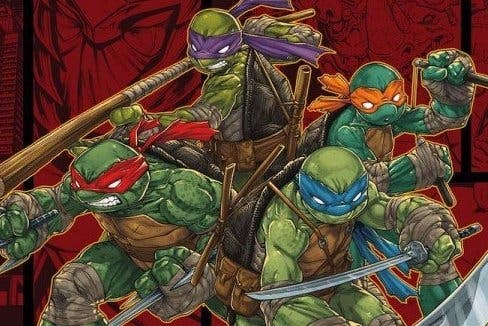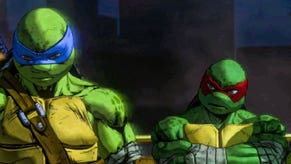Teenage Mutant Ninja Turtles: Mutants in Manhattan review
Licences mean compromise. Turtle power!
The Teenage Mutant Ninja Turtles arcade machine is an oddity which, despite not being all that great, enraptured a generation of players. The XBLA re-release's incredible sales suggests most of them still play games and, for whatever reasons, Turtles arcade is one of those games that has a little bit of resonance. Not least because most other video game interpretations of the Turtles, which seem to be prime 'game' material, have fallen so woefully short.
Even before Mutants in Manhattan was announced there was some buzz about the potential of it on social media - maybe it was a marketing plant, but it was one that worked because the combination made sense. Platinum Games, the action specialists, with a beloved action license - and if Transformers Devastation was anything to go by, the least we could expect is a solid brawler with a beautiful nostalgia-kneading visual style. This would have been an acceptable outcome but, for reasons best known to itself, Platinum has chosen instead to spin the wheel and bet it all on the number four.
There are good reasons for focusing on co-op multiplayer, of course, not least the fact that the Turtles are a foursome. But it's worth establishing upfront that of all the things it gets wrong, Mutants in Manhattan offers a below-par single-player experience. There are many reasons for why it feels so empty but the crux is that this is a game designed with an ideal scenario in mind - which is four players co-oping. Once you understand this, things like the short, randomised stages and the power of the turtles' abilities when comboed begin to make sense. In a reversal of normal roles, single-player ends up feeling like the offshoot.
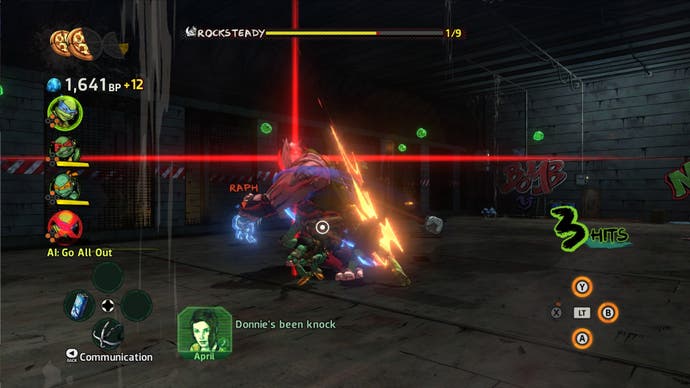
This would be more forgivable if the game had local co-op options. Obviously there are adults who will want to play this for old times' sake, and I'm one of them, but fundamentally Turtles is a children's franchise, and the game will be selling to parents. If this is the kind of audience Mutants in Manhattan has then it seems almost absurd it can't accommodate local co-op, particularly with the overall design so heavily dependent on multiplayer.
But then, maybe it is all about the nostalgia. Mutants in Manhattan is a modern take on the arcade brawler, clearly made with a few classic turtles games in mind, and goes for re-creating the spirit rather than the letter. One neat decision is to make most stages a combination of an 'open' environment with randomised objectives, which is because replay is the big goal here. The turtles' unfussy and snappy traversal abilities are a good match with this, letting players wall jump and rail-grind quickly between points, even if you're always only thinking of the next battle.
Each stage offers up a number of brawls against increasingly-competent grunts, some of which take place around an objective (things like 'hacking' a terminal, all of which involve holding B) and the biggest entertainment factor is whether you're playing alone or with others. Playing solo means the other three turtles are AI-controlled, you can switch between them, and they'll revive you quickly. The AI is not the problem, it's competent enough in the fights, but something about being a quarter of a computer team just doesn't feel radical.
Even with one other player things improve, but it's on those rare occasions you manage to assemble a full team that Mutants in Manhattan really begins to shine. There are more and tougher enemies, greater co-ordination between the team over objectives, and finally you're able to start synchronising the special moves and counters with some sort of rhythm.
The Turtles themselves look fantastic in motion - Michaelangelo spins his nunchuks as he sprints, cracks into massed enemies with devastating swipes, and pirouettes out of their clumsy reach while just about keeping balance. Each moves at a slightly different speed and has their own little touches and special moves, alongside a pool of shared abilities. Raphael looks and hits like the bruiser he is.
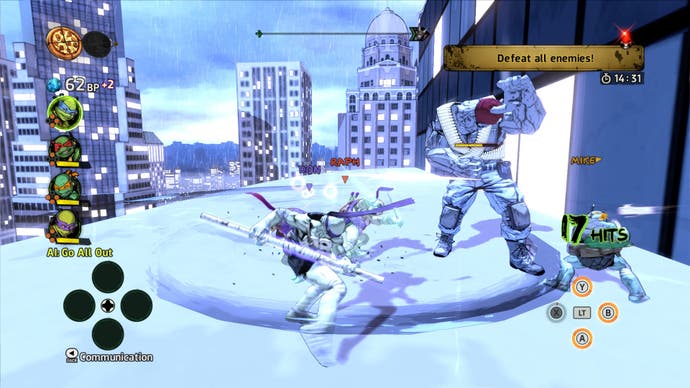
The combat system is simple but precise, and lends itself to mashing on the attack with the real skill being dodging, parrying, and combo-ing the turtles' special abilities. Enemy attacks are telegraphed in various ways and can be countered with a grab that disables them for the other turtles, or directly parried. Chucking out endless flowing combinations with any of the turtles is no problem, so dodging all the incoming fire to keep it going is where the skill lies.
This hits a peak with the boss fights, which run a gamut of classic turtles foes and have the brilliant addition of 'secret' elements - when fighting Rocksteady the first time it was just him, but on replaying a level and getting a higher score Bebop turned up halfway through the battle. Every one is deadly, comes complete with multiple health bars, and initially seems like a wall.
Taking on these bosses with four turtles is where Mutants in Manhattan rises above the many questionable decisions made in its development, and for beautiful ten-minute chunks of time becomes the Platinum Turtles game we all wanted. The individual turtles can be bodied around and take serious damage, so everyone on the team knows to watch out for the quick revives, and gets good at dodging - leading to the amazing spectacle, for the ten year-old boy inside me, of the four turtles diving away in sync as a giant red claw flails past where they just were.
You learn to stand back and use the gadgets, call out successful counters as an opening for the rest of the team, and use special attacks in concert to chunk down the huge health pools quickly. The arcade vibe is unmistakeable, not least in the direct translation of some characters' attacks, but also in the brutal margins and intense danger as the fight reaches a climax and the boss begins glowing red. In the right situation these fights are thrilling, and there's nothing like seeing Raph go flying past your ears just as you charge a livid Super-Shredder.
There's nothing wrong with shooting for the moon, and in these moments Mutants in Manhattan at least grazes it. But in focusing so completely on the ideal situation it has compromised the game's remainder too far. With three other players, the basic and clunky parts of Mutants in Manhattan's design are ameliorated, and the best sequences shine. But in single-player it never gets close to this intensity, there's always something missing, and even with one or two buddies it's still never quite as good as the full team.
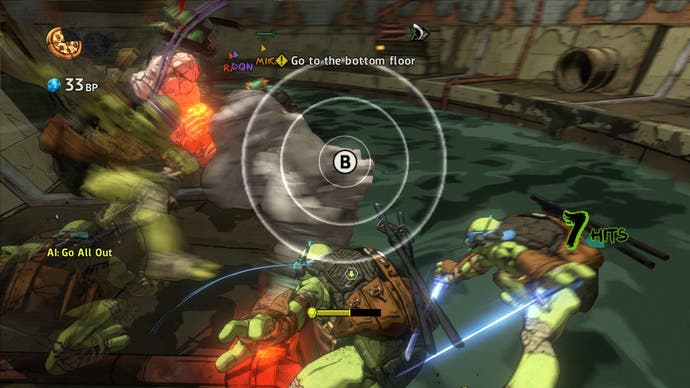
It's a bold decision, to be fair. And perhaps Platinum would have been better off delivering something more cookie-cutter, along the lines of Transformers, rather than creating a TMNT fantasy that only really works with four players. It's even more confusing when you think about other choices - this design would be so much easier to understand if the game featured, for example, drop-in online multiplayer nevermind the absence of the local option.
Even at launch Mutants in Manhattan just doesn't have the playerbase to support what Platinum is trying to do, and in this light releasing the game at full price seems foolish. Mutants in Manhattan needs a healthy player count to make it work, but I've been trying to get matches on PC every night since release and have managed to find three other players only twice. I've had amazing moments with this, but that's only a chunk of the overall time spent.
That's the thing, you see. Almost from the off Mutants in Manhattan makes you dislike it with back-and-forth objectives, the learning curve of the first boss experiences, and the emptiness of switching from turtle to turtle yourself. Then you finally get in a multiplayer online match and something hoary and long-forgotten clicks. When I was a kid I loved that Turtles arcade machine, and it feels like the developers behind Mutants in Manhattan did too. It's always a better game in your mind than it really was. In some way this re-creates something vital to that - even if it is just the nails boss fights and four players making it all seem better.
That doesn't make Mutants in Manhattan a classic, far from it, but if you ever lusted over that old Teenage Mutant Ninja Turtles arcade machine as a kid... well. You might find a few kindred shells, and some special moments, in Platinum's most quixotic, self-defeating and occasionally wonderful action game yet.
